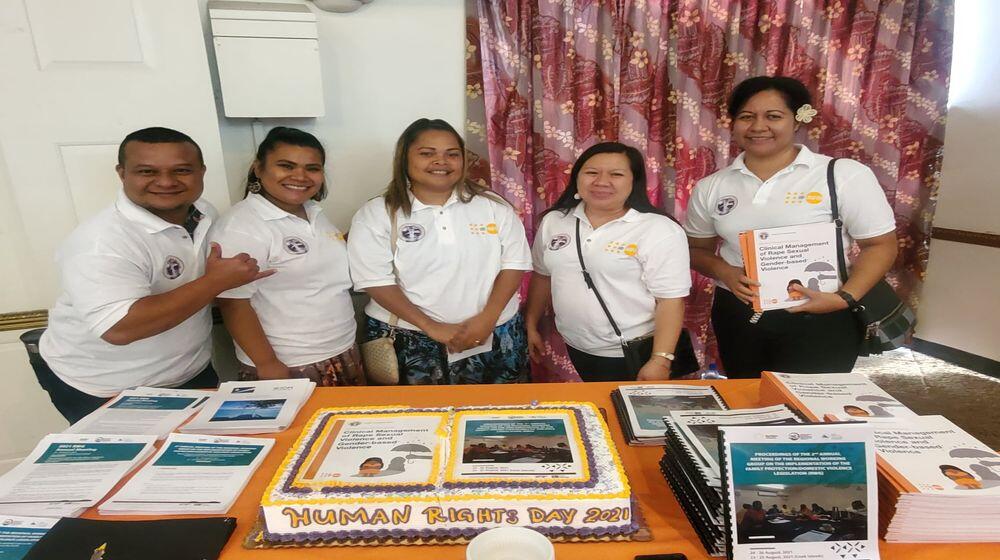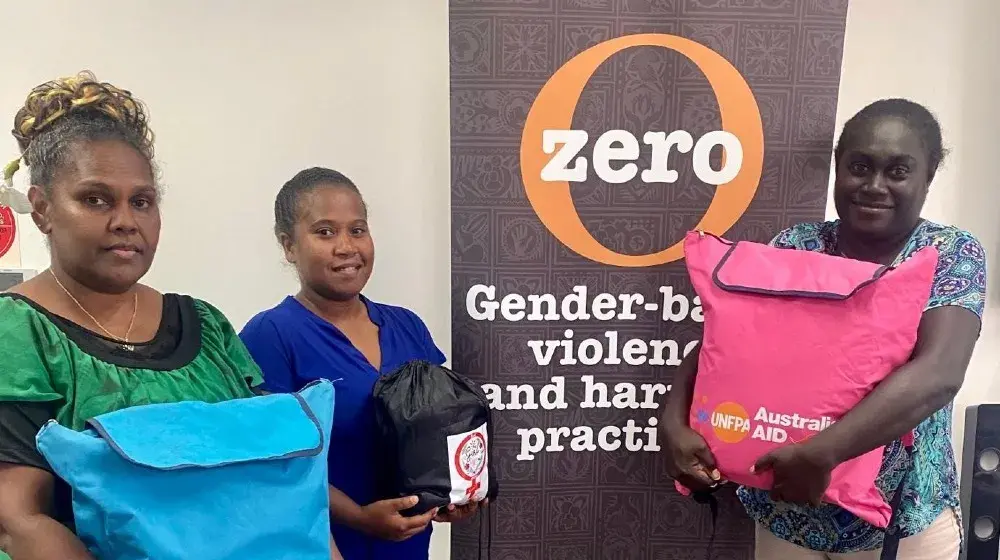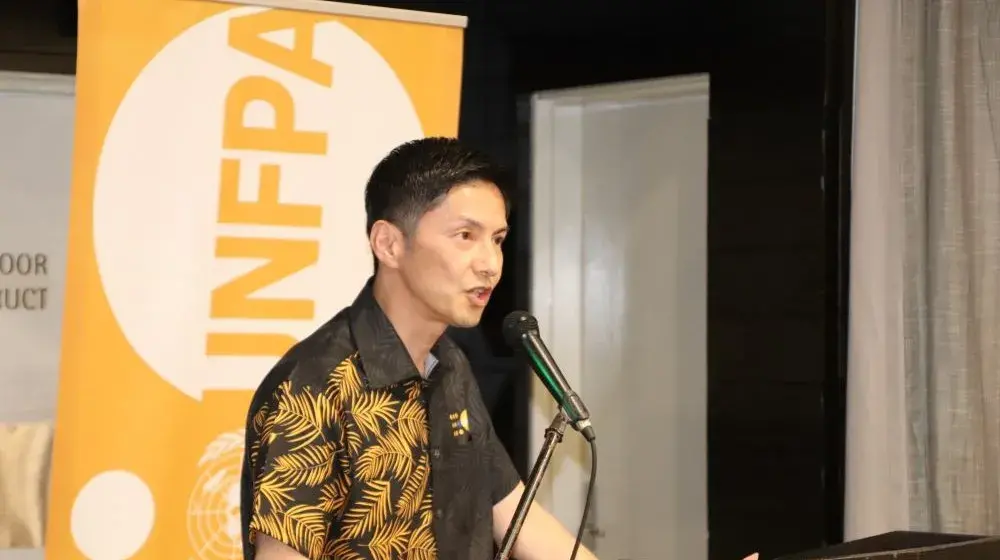The Republic of the Marshall Islands is one of the fourteen pacific countries which UNFPA has served over the past four decades.
"We are happy to see our relationship grow to support a country-owned and country-led pathway to universal health coverage, including universal access to sexual and reproductive health and reproductive rights, and progress the elimination of gender-based violence. As the Minister for Health has described before, Kumiti Ejmour” means that health is a shared responsibility, and in the Marshallese culture, the whole community supports promotion of good health. Having a whole-of government and whole-of-society approach is necessary to fulfil the vision of universal health coverage. The same applies to address the serious problem of gender-based violence," said Saira Shameem, Deputy Director of Unfpa Pacific during the launch last week Friday, 10 December, 2021.
"We know that across the Pacific that COVID-19 has exacerbated gender inequities and gender-based violence, with increased incidence of violence under lockdowns. There are also signs that child marriage and harmful practices are increasing. While RMI has been spared a severe COVID-19 outbreak and lockdowns, the concern about GBV impacting on women and children remains.
The powerful Family Health and Safety Study conducted in 2014 told stories behind the statistics that found that over two-thirds (69% ) of women aged 15-49, had experienced physical or sexual violence in their lives by someone, partner or non-partner.
• 48% of ever-partnered women reported having experienced physical violence in their lifetime and 16% had experienced physical violence in the 12 months.
• Of concern is that 38% of younger respondents, aged 15–24, had already experienced partner violence in their lifetimes.
• More than 20% of ever-partnered women have been sexually abused by their partner.
• Nearly 80% of women have experienced at least one type of controlling behavior. Among the most reported controlling behaviors measured were: whether he insists on knowing where she is at all times (71%); she needs to ask his permission to seek health care (48%).
• There is also a concern about violence by other perpetrators with one out of three women (33%) experiencing physical violence in their lifetime, mostly female and male family members.
10% of women have experienced sexual violence by a non-partner.
Nearly 11% of respondents experienced childhood sexual abuse before the age of 15, with most abuse occurring between the ages of 10 and 14 year, mostly perpetrated by male family members.
This was confirmed by clinicians who are seeing girls as young as 12 and 13 in antenatal clinics.
What do women think about this violence? Worryingly, the survey found that nearly three-quarters of women believe that a man is justified in beating his partner if she disobeys him or finds out she has been unfaithful. Of real concern is that these views are shared by younger women, with 83% agreeing with statements justifying a man’s hitting his partner.
All these concerning figures do not fully portray the trauma and pain that women and families face when dealing with violence. Yet 91% never sought help after experience violence, and half never told anyone. If they did report, it was mostly to friends (20%), parents (15%) but only 1% to police or doctor or health worker.
It is important that women can trust the health services and health care providers so that they will increasingly seek help. They need to be able to trust that health-care providers will listen to them, believe them, provide the right support and clinical care and help keep them safe; that the health-care providers will not tell everyone about their situation; that they will not feel ashamed by telling their painful story.
The MOHSS (Ministry of Health and Human Services) has been proactive in responding to the concerns about sexual and gender-based violence and appointed Dr Holden Nena as the GBV focal point in in 2020. His passion led to the formation of a committed team of clinicians who analysed the local response and reviewed and validated a Standard Operating Procedure (SOP) for clinical management of rape, sexual violence and gender-based violence.
The SOP addresses the health system response, and its development was a wonderful collaboration between local clinicians, social workers and local support services.
It was also a broader collaboration with UNFPA supporting the MOHSS, Majuro and Ebeye hospital departments, the Ministry of Culture and Internal Affairs, the Ministry of Justice and the CSO, WUTMI, to identify referral pathways and understand each other’s roles. This group were the ones who delivered the training and discussed and resolved local concerns and issues; they were ones who remain in RMI and will continue to roll out training and ensure sustainability of the health system response.
The 10th of December, we mark the conclusion of 16 Days of Activism for 2021 and we acknowledge today as World Human Rights Day. In tribute and support, we are honoured to participate in the launch the Standard Operating Procedures for Clinical Management of Rape, Sexual Violence and Gender-based Violence.
Honourable Minister Jemi Nashion and distinguished guests, in conclusion, please allow me to appreciate the value and quality of genuine and durable partnership. It is a critical component in making the promise of the International Conference on Population and Development (ICPD) Plan of Action, the Fourth World Conference on Women in Beijing, and regional frameworks such as the Pacific Island Leader’s Gender Equality Declaration, and, the regional Parliamentarian’s Moana Declaration a reality for the people of the Republic of the Marshall Islands.
This launch is a demonstration of governments’ commitments to promote women’s rights, and to respect women’s choices about their bodies and their futures. UNFPA Pacific is proud to have supported this SOP process and stands committed to supporting government and civil society initiatives to eradicate violence against women and children. There has been significant progress in realizing these commitments in the Marshall Islands, but full implementation requires continued concerted efforts by government, civil society and development partners. What we need now is for every one of us here today to spread this message and also to ask ourselves how can we stop accepting violence in our families and communities as normal? What can each of us do to support women and children, in our homes, our villages, our communities, our churches?





